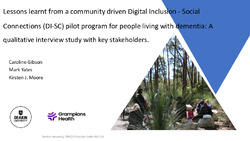Please use this identifier to cite or link to this item:
http://hdl.handle.net/11054/2331| Title: | Lessons learnt from a community driven digital social connection pilot program for people living with dementia: A qualitative interview study with key stakeholders. |
| Author: | Yates, Mark Gibson, Caroline Moore, K. |
| Issue Date: | 2023 |
| Conference Name: | Western Alliance 2023 Symposium. |
| Conference Date: | November 21-22 |
| Conference Place: | Warrnambool, Victoria |
| Abstract: | Background/aim: In response to COVID 19 and mandated physical distancing, a new digital social connection program was developed and implemented by the local community in a large regional town in Victoria, Australia. This pilot program, the Digital Inclusion-Social Connections (DI-SC) program, aimed to support people living with dementia to use a digital device to access social connection activities. The objective of this study is to inform the local community implementing the DI-SC program of key stakeholder experience of DI-SC process and outcomes to support future development and potential translation of digital social connections programs for people living with dementia. Population/setting: People involved in the development and implementation of the DI-SC program and the persons living with dementia and their care partners who participated in the DI-SC program. Methods: Qualitative study design. Three semi-structured focus groups and two interviews were conducted with a total of fifteen participants. Data was transcribed verbatim and thematically analysed. Results/findings: Three main themes were identified describing factors as influencing the process and outcomes of the DI-SC program: understanding dementia; personal choice and control; and service planning and coordination. Six sub-themes were identified: matching capability; establishing a relationship; creating opportunities for different interactions; ownership of the device, program coordination and defining the volunteer digital mentor role. Conclusion: Key stakeholders perceived the DI-SC program as an acceptable way of supporting people living with dementia to engage in activities they found enjoyable promoting social connection with care partners and others. DI-SC program outcomes were impacted by inappropriate training and a lack of program coordination. Translational impact/implications for future practice: The findings of this study may inform future development and implementation of digital social connection programs for vulnerable populations at risk of social isolation. |
| URI: | http://hdl.handle.net/11054/2331 |
| Internal ID Number: | 02343 |
| Health Subject: | DEMENTIA SOCIAL ISOLATION SOCIAL PARTICIPATION COVID-19 |
| Type: | Conference Presentation |
| Appears in Collections: | Research Output |
Files in This Item:
| File | Description | Size | Format | |
|---|---|---|---|---|
| Lessons learnt from a community driven digital social connection pilot program for people living with dementia A qualitative interview study with key stakeholders.pdf | 496.05 kB | Adobe PDF |  View/Open |
Items in DSpace are protected by copyright, with all rights reserved, unless otherwise indicated.
